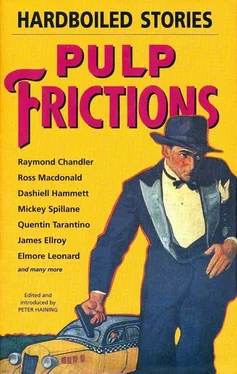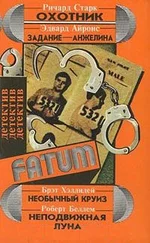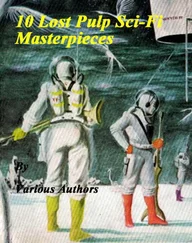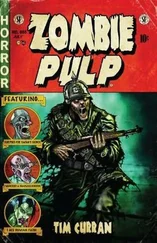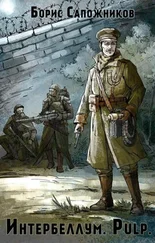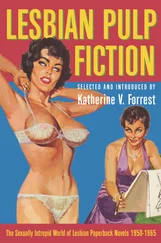He closed and bolted the door behind him, and took a swig at the bottle on the table. Beside it was an automatic. There was another in Franchini’s hand.
Franchini put the second gun down beside the first and sat at the table with the two guns in front of his hands, which lay on the table behind them.
‘You gotta gun?’ he asked.
Fremer pulled the police pistol out of his pocket and threw it on the table.
‘No shells,’ he said laconically. ‘There was only two in it, an’ I used ’em on the guy in the Ford I came down in.’
Franchini nodded.
‘OK,’ he said. ‘We’ll wait for the dame.’
They sat there waiting, taking swigs from the bottle on the table.
It was quiet. Franchini was just taking a wallop at the bottle when they heard a car grind round the corner outside. Fremer, who had his fingers under the table ledge, suddenly uptilted the table. Franchini’s guns crashed to the floor. Simultaneously Fremer went across the table top at Franchini.
The door smashed open. Half a dozen cops under a police lieutenant burst in with their guns showing.
‘Stick ’em up, boys,’ said the lieutenant. ‘We got a date for you two with the hot seat. Take it easy now.’ He snapped the steel cuffs on Franchini and turned towards Fremer with another pair.
Fremer kept his hands up.
‘OK, lieutenant,’ he said. ‘Just feel in the lining of my coat and you’ll find my badge. I’m Lemmy Caution, New York “G” Division. We played it this way to get Franchini. I guessed the dame would come and spill the works to you.’
The lieutenant found the badge. Caution dropped his hands. Franchini began to be sick in the corner.
‘You’re a mug, Franchini,’ said the ‘G’ man. ‘You oughta know that dame of yours was always stuck on Lloyd Schrim. We reckoned that if we planted a fake story about some guy called Fremer bustin’ out of the big house an’ taking it on the lam to New York, and splashed his picture on the front page, she would fall for the set-up.
‘How the hell do you expect a woman to be in love with a guy and have two killers bottled up in a room and not squeal when she’s just been told that her boy friend was dyin’ of TB through workin’ in the jute mill; that they was ridin’ him for not talkin’ over a job that she knew durn well that he never pulled?
‘She reckoned that the ten grand she’d get for turnin’ us in would fix an escape for him. I thought she would, an’ took a chance on it. Take him away, boys.’
The ‘G’ man limped down the steps at Moksie’s. He walked over to the bar and ordered rye. Moksie pushed the bottle over the bar.
The ‘G’ man picked it up and walked over to the corner table where the woman was slumped. Her head was between her arms. She was crying.
He sat down opposite her and put the bottle on the table. He put his hand under her chin and pushed her head up. She fell back in the chair.
‘Cut it out, sister,’ he said. ‘It can be tough. I suppose they told you that there wasn’t goin’ to be no reward, huh? That it was a frame-up? Well, that’s the way it goes. Have a drink an’ stop the waterworks. It annoys the customers.’
She took a drink from the bottle.
‘You’re funny, ain’t you, copper?’ she said. ‘It’s a big laugh, ain’t it? You pull a fast one on me, an’ I shoot my mouth an’ wise you up to where Franchini is hidin’ out, an’ you get him fried and I’m left on the heap.’
The ‘G’ man grinned.
‘Listen, sweetheart,’ he said. ‘This act wasn’t so easy to put on. I ain’t had any food for two days an’ I walked on this broken shoe so as to give myself an honest to goodness blister.
‘Another thing, it ain’t so bad as it looks. You see, I handled that Polecat Inn shootin’ a long time ago. I never believed that your boy friend pulled it. As a matter of fact, Franchini did it, an’ Lloyd took the rap for him an’ wouldn’t talk. When Franchini bumped that last mug an’ scrammed, an’ we couldn’t find where he was, I thought this little act up an’ it worked.
‘Have another drink an’ then let’s go and eat. There’s a guy waitin’ for you down at Centre Street by the name of Lloyd Schrim. I had him sprung this mornin’. He reckons he wants to marry you or something like that.
‘An’ there ain’t no need to ask a lotta questions. He never worked in no jute mill an’ he ain’t got TB.
‘Say, do you know what’s good for a blister?’
The Lady Says Die!
Mickey Spillane
The English crime fiction historian, H. R. F. Keating, has called Mickey Spillane’s most famous character, Mike Hammer, ‘perhaps the nastiest hardboiled dick ever to stalk the pages, a great kicker in the groin, shooter in the belly, breaker of bones, gouger out of eyes and burner up of baddies in general’. Even the American magazine Time takes a similar view, having declared in a feature about the man and his creator, ‘The forces of law, order and decency prove no match for Mickey Spillane’s private eye, whose impatience with these virtues amounts to a crusade.’ Such views have, however, done nothing to diminish the popularity of the Hammer novels, beginning with I, the Jury, published in 1947, which have sold by the million ever since. Certainly, few other hardboiled dicks have been able to match the sales of Spillane’s books which have nevertheless been condemned for their sexual content — although by today’s standards the descriptions are pretty tame. The author has admitted that his inspiration for Mike Hammer was the genre’s ‘founding father’, Race Williams, a comment which prompted pulp historian Ron Goulart to observe somewhat grudgingly, ‘Hammer can be seen as a sort of bloated caricature of Williams, even though he lacks Williams’ inadequate attempts to explain.’
As a result of the success of the Mike Hammer books, Frank Morrison (Mickey) Spillane (1918-) was one of the world’s most popular novelists during the Fifties and Sixties, a far cry from his upbringing in a tough neighbourhood of New Jersey. His early writing was for comic books and he was one of the originators of Captain Marvel and Captain America. After serving as a pilot in the American Air Force during the Second World War, when he flew many combat missions, Spillane was employed for a time by the FBI and helped to break up a narcotics ring. The violence and gunshot wounds he suffered during this operation provided him with much of the first-hand physical and emotional experience which he used to such effect in the Hammer novels and his other series of books about a lone espionage agent, Tiger Mann.
Cops and lawmen tend to play secondary roles in most of Spillane’s novels, and it is only in his short stories that any of them move to the centre of the stage. Among the most interesting of these law officers is Inspector Early, a sharp, no-nonsense cop who becomes embroiled in a case of murder and high finance in ‘The Lady Says Die!’ The story is making its first anthology appearance since it was published in Manhunt Detective Story Monthly in October 1953 and offers something of a new dimension to what is generally perceived as the Spillane tradition.
* * *
The stocky man handed his coat and hat to the attendant and went through the foyer to the club’s main lounge. He stood in the doorway for a scant second, but in that time his eyes had seen all that was to be seen: the chess game beside the windows, the foursome at cards and the lone man at the rear of the room sipping a drink.
He crossed between the tables, nodding briefly to the card players, and went directly to the back of the room. The other man looked up from his drink with a smile. ‘Afternoon, Inspector. Sit down. Drink?’
Читать дальше
